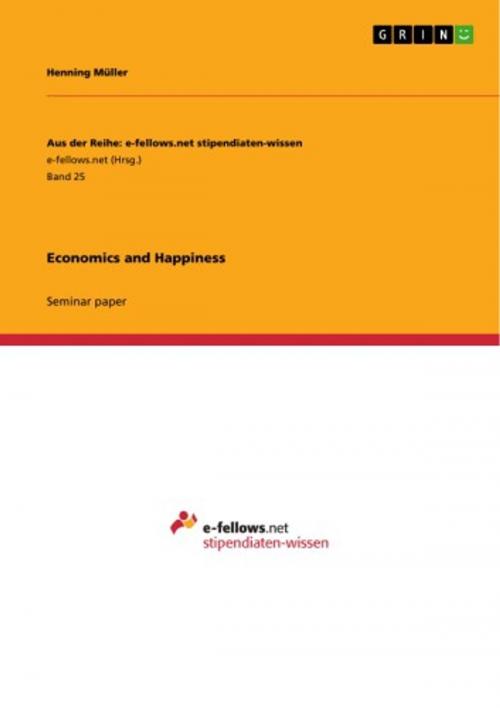| Author: | Henning Müller | ISBN: | 9783640945160 |
| Publisher: | GRIN Publishing | Publication: | June 28, 2011 |
| Imprint: | GRIN Publishing | Language: | English |
| Author: | Henning Müller |
| ISBN: | 9783640945160 |
| Publisher: | GRIN Publishing |
| Publication: | June 28, 2011 |
| Imprint: | GRIN Publishing |
| Language: | English |
Seminar paper from the year 2009 in the subject Economics - Other, grade: 1,7, Johannes Gutenberg University Mainz, language: English, abstract: 'Money does not buy happiness' - with that statement Richard Easterlin (1974) somehow initiated a new field of research for economists. Within the last thirty years plenty of surveys and dozens of papers were produced to identify the determinants of happiness. Unfortunately little importance was attached to a definition or a consistent concept of what 'happiness' is. Only within the last decade happiness research has gained the self-efficacy to educe policy recommendations from its own insights - with ambiguous success. In my paper I will give a brief summary of the central findings in happiness research and introduce some approaches of explanations for surprising evidence. In the end I will present a few policy recommendations to illustrate the above mentioned dubiousness of success. As I have to present plenty of evidence I will set aside criticism of methodology in every single survey and leave it with a cross-the-board one right now: happiness research has to catch up to a considerable degree in methods of conceptualization, measurement and statistics. In the first section, I will present a general approach to the term 'happiness', its use and its measurement. Next I will describe the main identified and examined determinants1 of happiness - namely income, unemployment and inflation, democracy, hardship and inequality. Section 4 deals with concepts that perhaps can give a microtheoretical foundation for some of the results in happiness research. Not surprisingly they stem from psychology because classic economic theory assuming rational decisions ('homo oeconomicus') is not capable of describing irrationalities like rivalry, adaptation or aspiration level shifts. In the last section I will introduce some implications for policy found in literature. Finally, the content of this paper is summarized. Modern economic policy aims at stabilizing a steady economic growth. In contrast, Aristotle defines 'happiness' as self-sufficiency. Thus, there is an obvious discrepan-cy between happiness and what were reaching for today. So we should first take a look at what we want to study.
Seminar paper from the year 2009 in the subject Economics - Other, grade: 1,7, Johannes Gutenberg University Mainz, language: English, abstract: 'Money does not buy happiness' - with that statement Richard Easterlin (1974) somehow initiated a new field of research for economists. Within the last thirty years plenty of surveys and dozens of papers were produced to identify the determinants of happiness. Unfortunately little importance was attached to a definition or a consistent concept of what 'happiness' is. Only within the last decade happiness research has gained the self-efficacy to educe policy recommendations from its own insights - with ambiguous success. In my paper I will give a brief summary of the central findings in happiness research and introduce some approaches of explanations for surprising evidence. In the end I will present a few policy recommendations to illustrate the above mentioned dubiousness of success. As I have to present plenty of evidence I will set aside criticism of methodology in every single survey and leave it with a cross-the-board one right now: happiness research has to catch up to a considerable degree in methods of conceptualization, measurement and statistics. In the first section, I will present a general approach to the term 'happiness', its use and its measurement. Next I will describe the main identified and examined determinants1 of happiness - namely income, unemployment and inflation, democracy, hardship and inequality. Section 4 deals with concepts that perhaps can give a microtheoretical foundation for some of the results in happiness research. Not surprisingly they stem from psychology because classic economic theory assuming rational decisions ('homo oeconomicus') is not capable of describing irrationalities like rivalry, adaptation or aspiration level shifts. In the last section I will introduce some implications for policy found in literature. Finally, the content of this paper is summarized. Modern economic policy aims at stabilizing a steady economic growth. In contrast, Aristotle defines 'happiness' as self-sufficiency. Thus, there is an obvious discrepan-cy between happiness and what were reaching for today. So we should first take a look at what we want to study.















